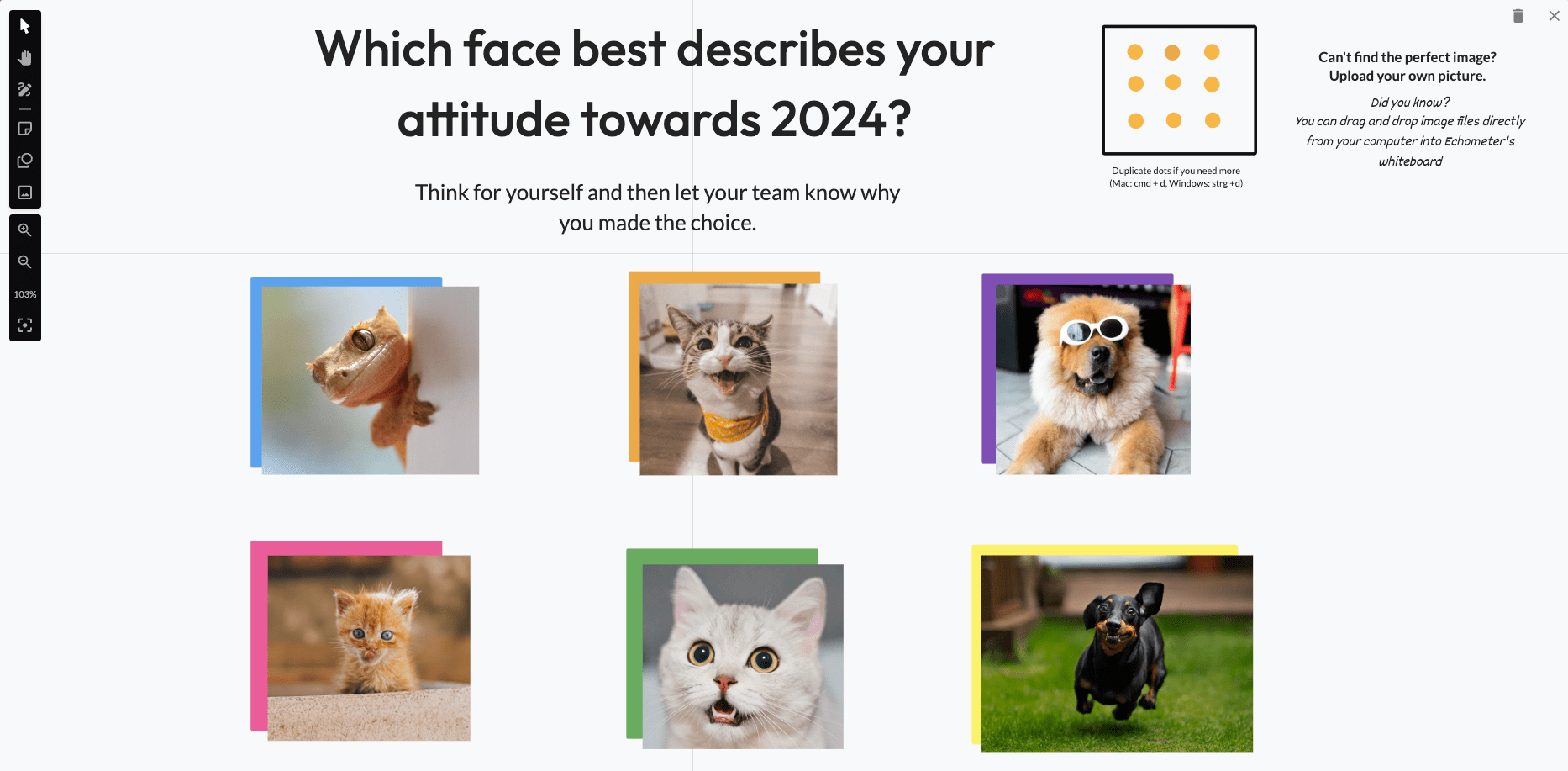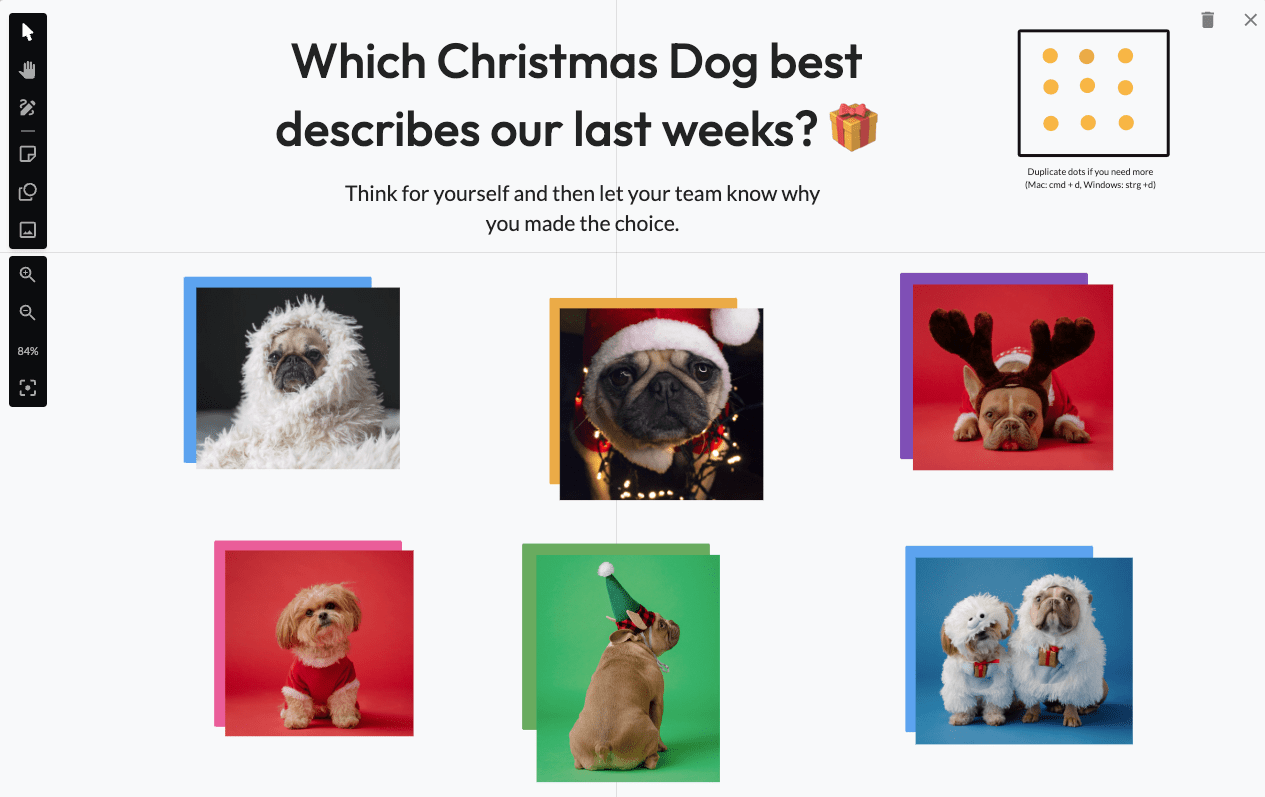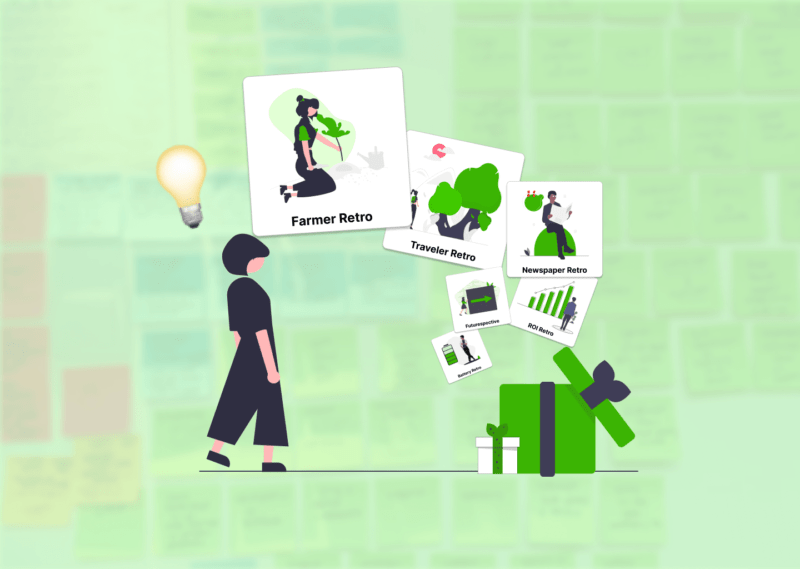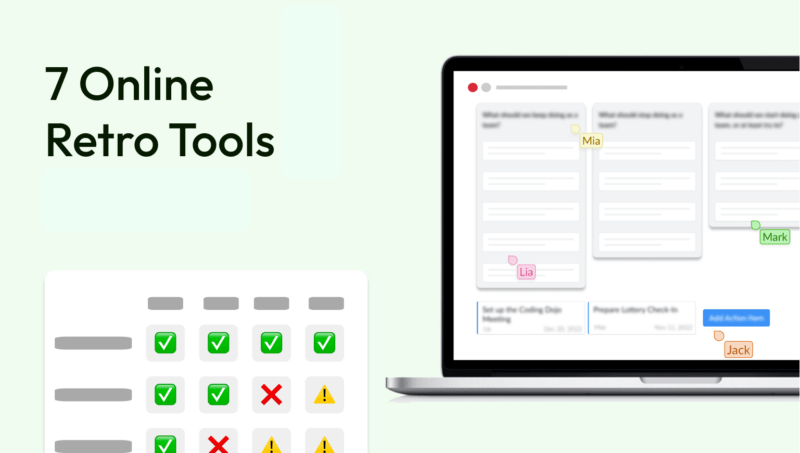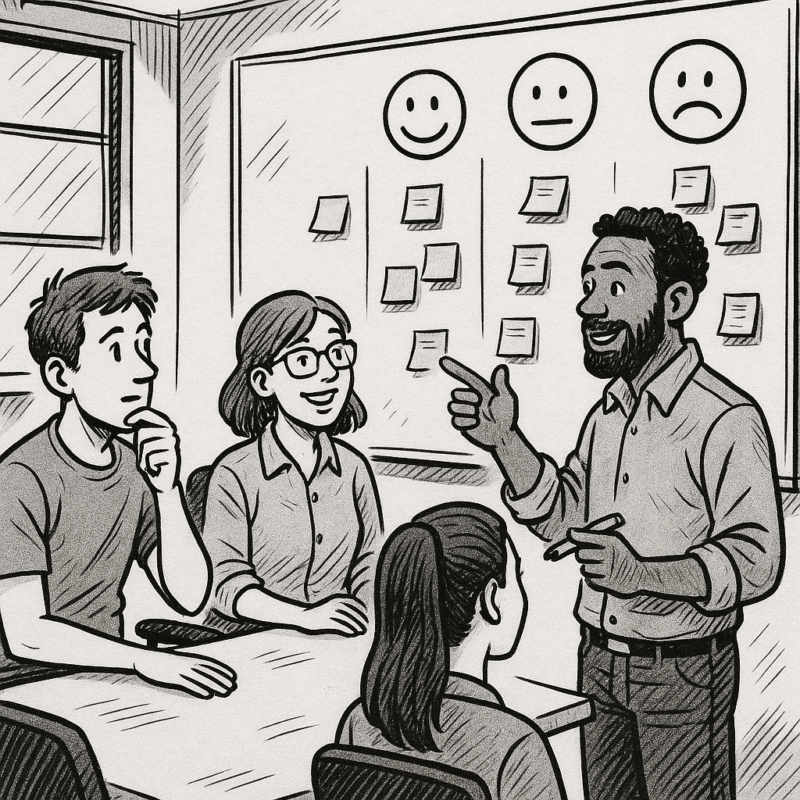Especially at the turn of the year, there are good opportunities to adapt the format of the retrospective to the Christmas season and New Year. In this article we share a few ideas on how good metaphors can spark creativity and reflection in the team. Have fun getting inspired!
If you're looking for retrospective ideas that work throughout the whole year, I warmly recommend to check out our post 32 kickass retrospective ideas for agile teams.
Create the right setting for a year-end and new year retro
In every retrospective, it is important to set the right framework. Usually, retrospectives focus on the “sprint” as a reference period. Around Christmas time, it can be worthwhile to consciously stretch the frame a little further.
By consciously looking at the entire year, more comprehensive, overarching reflections can arise in the team that otherwise tend to get lost in sprint retrospectives.
In the following ideas for your Christmas, year-end or New Year retrospectives, I always use the whole year as a frame of reference. If you prefer, you can of course simply paraphrase the questions so that they relate to a shorter period of time –, for example a quarter, or a sprint.
Icebreaker Ideas for the agile Christmas Retrospective
The retro should start (according to the 6 phases of every good retrospective) with an icebreaker or a warm-up to get in the right mood for the agile workshop (see our blog post: Every good agile retrospective has these 6 phases).
Simple, good retrospective icebreaker questions for Christmas in addition to the standard questions can be, for example, the following - you can also adapt them to New Year, of course (Here you will find 21 Icebreaker classics for every season):
- Reflection on the last few weeks: If our last agile sprint was Christmas, what was the weather like?
- Reflection on the last few weeks: Imagine our last sprint was the family Christmas get-together. What was the best present (alternatively: best moment, biggest mess...)?
- To get to know each other: What is your favorite Christmas tradition (alternatively: New Year's tradition)?
- To get to know each other: What is your favorite meal at Christmas (alternatively: at New Year)?
- To get to know each other: What was your worst (funny) Christmas experience or memory (alternative: New Year's experience)?
If you want to make it even more visual, you can of course also use a Scrum Retrospective Whiteboard from our Echometer tool for your Retro Icebreaker. Below is an example that may provide an interactive introduction: Which face best describes your attitude towards the new year? You can even use this Retro Icebreaker in our tool (for free) using the button.
Icebreaker for your New Year's sprint retrospective
Duration: 3-10 minutes | Goal: Find out the goals & needs of colleagues
Icebreaker Board Template for your Christmas Retrospective
Duration: 3-10 minutes | Objective: Reflection on the last Scrum Sprint
Ideas For The Christmas Retrospective
The first two retro ideas are specifically aimed at Christmas as an occasion.
Christmas retrospective format 1
🎄 The Christmas Tree Retrospective
Open questions
Candles on the Christmas tree: What epiphanies did we have this year?
Gifts under the Christmas tree: Which of your wishes were fulfilled (perhaps by a team member) this year?
Wish list: What wishes have unfortunately not been taken into account this year?

Christmas retrospective format 2
🎅 Nicholas & Knecht Ruprecht retrospective
Open questions
Nicholas: What positive qualities and good deeds will Santa Claus praise us for this year?
Servant Rupert: What negligence this year might have been noticed by Servant Rupert?

Christmas retrospective format 3
⭐️ Christmas Star Retrospective
Open questions
Direction: Where do I wish for guidance?
Light: What gives me light and strength?
Time: What will shine for a long time?
Constellation: Which stars can we connect, which patterns can we recognize?

Ideas For The Year-End Retrospective
Year-end retrospective Format 1
🔙🏔 The Mountaineers Retro (Retrospective)
Open questions
Detours: Looking back, where did we take detours?
Obstacles: Where did we encounter obstacles?
Bridges: What support have we received as a team along the route that we should be grateful for?
Findings: What preparation tips would we give to a team that is now embarking on the same journey?

End-of-year retrospective Format 2
🥂The New Year's Eve retrospective
Open questions
Review: Which intentions could be implemented?
Toast: What should we toast to?
Resolutions: What new resolutions do we have for next year?

Ideas for the New Year retrospective
For the New Year, on the other hand, you can look further ahead in the retrospective. This works, for example, with these retro formats:
New Year's retrospective format 1
🏔🔜 The Mountaineers Retro (Outlook)
Analogous to the retrospective mountain climber retro, this format can also be used wonderfully for the outlook into the new year:
Open questions
Milestones: What milestones are on our route this year?
Obstacles: What obstacles await us on our route before each of these milestones?
Preparation: What preparations should we make / pack gear to best tackle all the milestones for the coming year?

New Year's retrospective format 2
🎆 The Fireworks Retro
Open questions
Toast: Which successes of the past year can we toast to together?
Goodbyes: What problems from last year do we want to say goodbye to in the coming year?
Resolutions: What resolutions for the New Year could we reasonably make?

5 ideas for winter retrospectives
All the presents are unwrapped, the bellies are full and the Christmas lights are switched off again. So that the lights don't go out in your team after the holidays and you don't fall into hibernation, we have prepared 5 ideas for winter retrospectives for you. You will be able to toboggan easily until February. Hold on tight and let's go.
Winter Retrospective Format 1
🧣 The winter retro
Open questions
Snow: What have we almost forgotten under the blanket of snow?
Ice: Where do we have to be careful not to slip?
Stove: What warms us up again?
Anticipation: What can we hardly wait for?

Winter Retrospective Format 2
☃️ The Snowman Retro
Open questions
Lower Ball: What is the basis on which we can build?
Medium ball: What keeps us together?
Head: In which direction do we want to look? What do we want to keep in mind?
Cap: Which nice-to-haves would be great?

Winter Retrospective Format 3
🛷 The sledge retro
Open questions
Rise: Where was it worth pulling up the sled?
Lift: When would we have liked to have had a lift for support?
Sledge ride: Which sledge ride was particularly fun?
Obstacle: Where did we have to be careful not to fall over?

Winter Retrospective Format 4
❄️ The Snowflakes Retro
Open questions
Crystal: What makes us unique?
Snowflake: Which partnerships make us strong?
Wind: What gives us momentum?
Warmth: What melts us?

Winter Retrospective Format 5
🐿 The hibernation retro
Open questions
Sleep: What relaxes us?
Nuts: What gives us strength?
Cave: What gives us security?
Cold: What should we watch out for?

Bonus Tips For Retrospectives
📚 Tips For Moderating Team Retros
Are you still inexperienced with retrospectives or do you not use the format regularly? Then the retrospective at the turn of the year is probably a very good start for you and your team.
If you would like tips for moderating retrospectives, take a look at our eBook for moderation for retrospectives . Here we have compiled all the essential tips for retrospectives in an easily understandable and compact way.
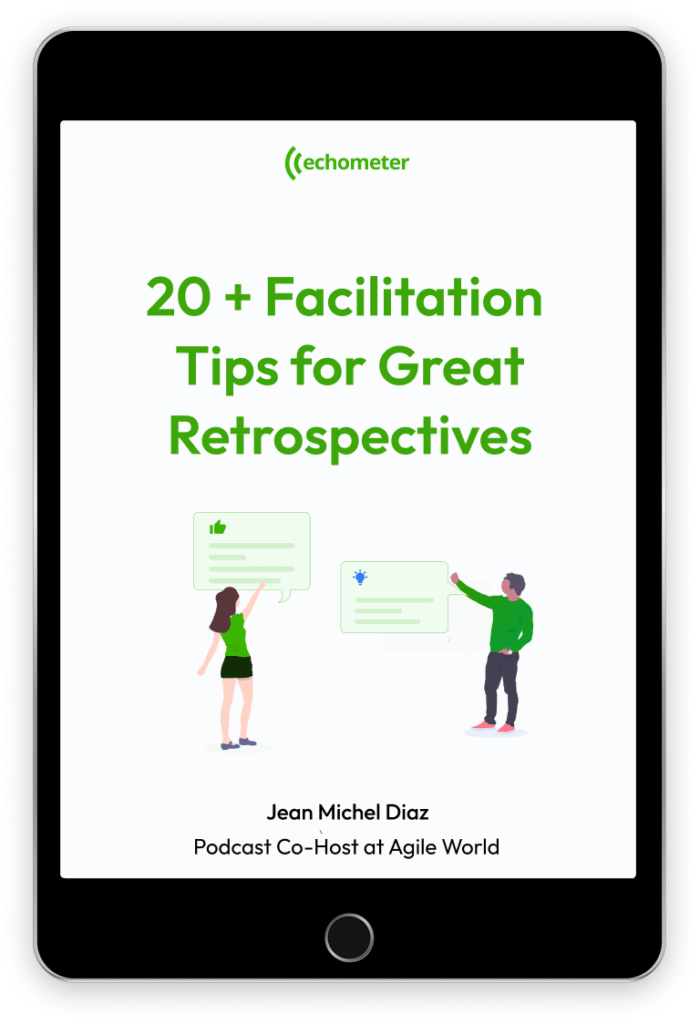
🏅 Practice Makes Perfect
Team retrospectives work best if you make them a regular routine in your team.
We have developed Echometer so that you can easily establish this retro routine for the coming year (without having to invest hours in preparation and follow-up each time).
Echometer offers you:
- Up to 80% time savings in the preparation and follow-up of retrospectives (Ø 90 minutes per retro on 20 minutes) ⌛️
- Guaranteed success through satisfaction surveys to the team after each retro (Ø score of> 8.2 / 10) 👏
- Visualize team development through continuous team health checks 📊
Have a look how Echometer simplifies your team development and makes it measurable and try it out for yourself!
But now I wish you a wonderful and insightful retrospective at the turn of the year!
By the way, if you are still looking for a suitable retro board, our article can help you with the topic: Comparing the 6 best retrospective boards
For managers: 1:1 meeting templates
In addition to a healthy team retrospective, self-reflection at an individual level is also key. Perhaps you have already established regular one-to-one meetings with your team members?
If so, then I highly recommend you try out our free one-to-one tool Echometer. Finally, your team member is engaged in the conversation with our – templates and their development can be measured in figures. Give it a try by simply using one of our templates as a basis:
No small talk, no awkward pauses. 🥱 This 1:1 template simply always works.
- What achievement are you proud of that I may not have noticed?
- What small change would immediately improve your work?
- What would you like to take more time for at work?
...


